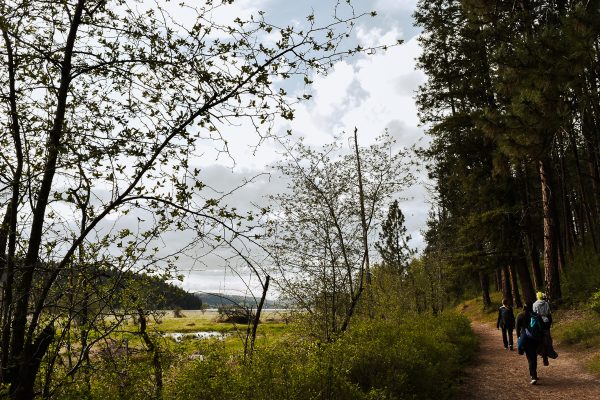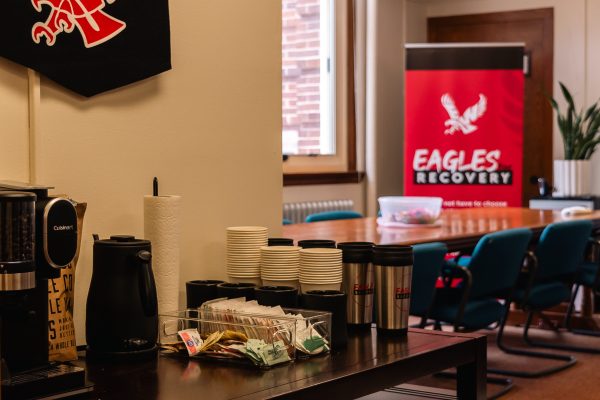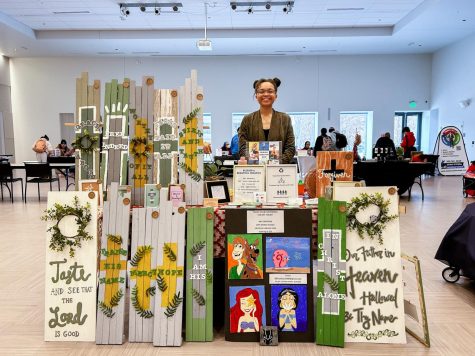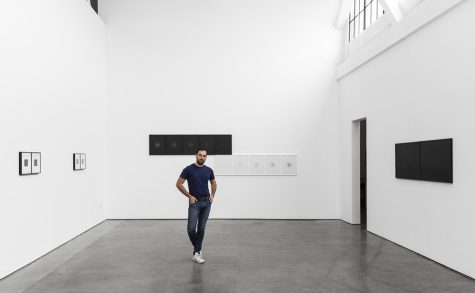EWU teachers pay homage to theatrical music

December 6, 2012
It was during ˝Dead Elvis˝ that Lynne Feller-Marshall walked out on stage with her bassoon while wearing a white pantsuit with flashy rhinestones, aviators and a black wig.
Feller-Marhsall’s impersonating of Elvis Presley made the audience laugh and cheer
Feller-Marshall and 14 other performers had spent weeks rehearsing material for EWU’s Evening of Theatrical Music on Nov. 30.
Kendal Feeney, the producer and director of the performance, said she wanted to have a presence in downtown Spokane.
Proceeds from the concert will go to funds for music scholarships at Eastern.
It was just a week prior to the concert that the 11 performers were in Feeney’s home rehearsing. They utilized the small space, doing a run-through of the performance’s second act,“L’histoire du Soldat,” or “The Soldier’s Tale,” by Igor Stravinsky and the performance’s first act piece, “Dead Elvis” by Michael Daugherty.
During rehearsal, “Dead Elvis” produced laughs.
Feller-Marshall said to her colleague, “I love how disgusting you make it, with the trombone and the trumpet and everything together. If you make it really disgusting it’s going to work really well.”
The piece’s twisted and distorted feel of a 1960s spy movie soundtrack was enough to make even the performers smile and chuckle while Foster held a note that she said, “takes four lungs to perform.”
Elvis did indeed leave the building, but not without throwing a scarf to the audience where a woman eagerly snatched it from a person sitting in front of her.
There were no special lighting techniques or microphones in the dinning room, no crowd to watch the musicians play their instruments.
The performers were the listeners and they listened for problems that themselves or others had with the music.
Julián Gómez-Giraldo, the conductor, took notes and worked with the musicians on their timing and tempo.
“Since they’re professional musicians you have to work with them more [because they know what they’re doing],” said Giraldo.
On stage at the concert, Feeney said to the crowd, “This performance is a showcase of the collaboration between artists.”
From Feeney’s house to the sound checks at the theater, the musicians discussed their issues with Giraldo and each other.
Tony Kacalek, technical director for the Bing Crosby Theater, said Feeney knew what she wanted for the performance.
“A lot of the time we get a promoter or a director who doesn’t know how to run a show, so it forces me to do more,” said Kacalek.
The musician’s collaboration was apparent as Feeney and pianist Jody Graves were playing “Cafe 1930” and “Nightclub 1960,” two tango pieces, together on stage.
Their facial expressions contorted with the fast and slow paces of the music, their head bobs and hand flourishes were in sync with not only the music but with each other.
“It’s just two performers making music,” said Feeney.
According to Feeney, Steve Mortier and Randel Wagner really wanted to do a piece called “Agony,” by Stephen Sondheim.
The song is from the musical, “Into the Woods,” a play about what happens after happily ever after. Its dark humor is apparent when the audience realizes that Rapunzel’s and Cinderella’s princes are competing about who is worse off.
Eloquently sung with an operatic tone, an inference about dwarf fetishes threw the audience into a fit of laughter in disbelief.
During rehearsal there was that balance of fun and work. Jokes were made as well as progress on the pieces.
“Everyone here gets along so well,” said Feller-Marshall.
The piece that saw more practice time, “L’histoire du Soldat,” ended the concert. A piece by Stranvinsky, it was one of the first pieces that had been composed for percussion noted Michael Waldrop, percussion instructor and percussionist for the event.
Rehearsing those big percussion parts made lighting fixtures in Feeney’s home shake. In the theater, it made the audience shake. The vibrations in the pitch black space could be felt even after the last drum was struck.






![Simmons said the biggest reasons for her success this year were “God, hard work, and trusting [her] coach and what she has planned.”](https://theeasterner.org/wp-content/uploads/2024/05/image1-1-1200x800.jpg)









